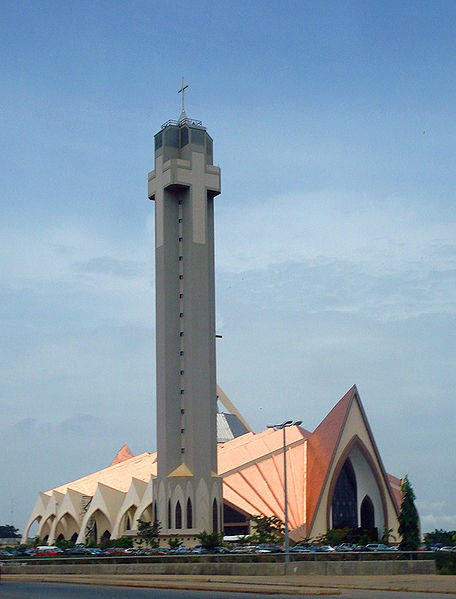National Church of Nigeria, Abuja
A December 2012 report on religion and public life by the Pew Research Center stated that in 2012, 49.3% of Nigeria's population was Christian, a decrease from 50.8% from 2011 report, 48.8% was Muslim which was same compared to the previous report, and 1.9% were followers of indigenous and other religions, or unaffiliated experiencing a slight increase. But it also predicted by 2030, Nigeria is expected to have a slight Muslim majority (51.5%).
The 2010s data of Association of Religion Data Archives has also reported that 46.5% of the total population is Christian, slightly bigger than the Muslim population with 45.5%,while 7.7% are members of other religious groups. However, according to the 2001's data of The World Factbook of CIA, about 50% of Nigeria's population is Muslim, 40% are Christians and 10% adhere to local religions Among Christians, 24.8% are Catholic, 74.1% are Protestant, 0.9% belong to other Christian denominations and a few of them are Orthodox Christians.
From the 1990s to the 2000s, there has been significant growth in Protestant Churches including the Redeemed Christian Church of God, Winners' Chapel,Christ Apostolic Church (the first Aladura Movement in Nigeria), Deeper Christian Life Ministry, Evangelical Church of West Africa, the Presbyterian Church of Nigeria, the Mountain of Fire and Miracles, Christ Embassy, The Synagogue Church Of All Nations, The Church of Jesus Christ of Latter-day Saints, theAladura Church, indigenous Christian churches especially strong in the Yoruba and Igbo areas, and of evangelical churches in general. The Churches have spilled over into adjacent and southern areas of the middle belt. Denominations like the Seventh-day Adventist Church in Nigeria and the Mormons have also flourished.
Other leading Protestant churches in the country are Church of Nigeria, of the Anglican communion, Assemblies of God Church, Nigeria, the Nigerian Baptist Convention and The Synagogue, Church Of All Nations. The Yoruba area contains a large Anglican population, while Igboland is predominantly Catholic and the Edo area is predominantly Assemblies of God which was introduced into Nigeria by Augustus Ehurie Wogu and his associates at Old Umuahia.
There are many types of Muslims, but the majority of Nigerian Muslims are Sunni, most of whom are Maliki, Shafi'i or Salafi. But a significant Shia and Sufi minority exists (see Shia in Nigeria). Most Sufis follow the Qadiriyya, Tijaniyyah and/or the Mouride movement. Some Muslims have incorporated radical and takfiri ideals, in particular the Vanguard for the Protection of Muslims in Black Lands. Some northern states have incorporated Sharia law into their previously secular legal systems, which has brought about some controversy. Kano State has sought to incorporate Sharia law into its constitution. The majority of Quranists follow the Kalo Kato or Quraniyyun movement. There are also Ahmadiyya and Mahdiyya minorities.
The core north is largely Muslim, there are large numbers of both Muslims and Christians in the Middle Belt, including the Federal Capital Territory. In the west of the country, especially in the Yorubaland, the population is said to be 60% Christian, 30% Muslim and 10% adherents of other African religions, while the southeastern regions are predominantly Christians with widespread traditional beliefs, Catholics, Anglicans, and Methodists are the majority with few traditional beliefs, while the Niger Delta region is mainly Christian.
Across Yorubaland in the west, many people are adherents to Yorubo/Irunmole spirituality with its philosophy of divine destiny that all can become Orisha (ori, spiritual head; sha, is chosen: to be one with Olodumare (oni odu, the God source of all energy; ma re, enlighthens / triumphs).
Other minority religious and spiritual groups in Nigeria include Hinduism, Judaism, The Bahá’í Faith, and Chrislam (a syncretic faith melding elements of Christianity and Islam). Further, Nigeria has become an African hub for the Grail Movement and the Hare Krishnas, and the largest temple of the Eckankar religion is in Port Harcourt, Rivers State, with a total capacity of 10,000.
by Wikipedia


 Time in Lagos
Time in Lagos  RSS Feed
RSS Feed